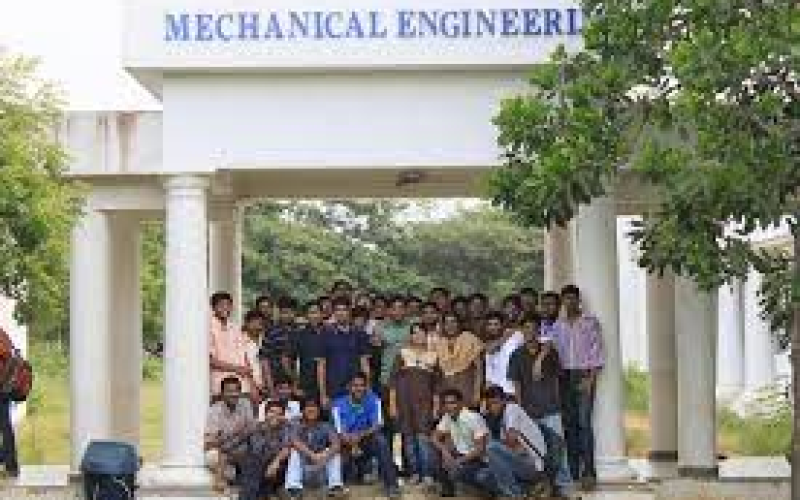B.E. in Mechanical Engineering
Mechanical Engineering is one of the core fields of Engineering, covering Thermal, Design and Production streams. From automotive to production, from engine technology to air conditioning and from designing to fabricating, Mechanical engineering has a lot of scope for Research, Development and Employment. Hence the focus of the department is to bring about an all-round development of the student to create a strong foundation for generating research and technology professionals in the field of Mechanical Engineering.
The curriculum for B.E. Mechanical Engineering includes:

Technical English

Matrices and Calculus

Engineering Physics

Engineering Chemistry

Problem solving and Programming in Python

Engineering Graphics

Engineering Graphics

Engineering Physics

Complex Functions and Laplace Transforms

Fundamentals of Mechanical Engineering and Practices

Environmental Science

Engineering Mechanics

Basic Electrical and Electronics Engineering

Statistics and Numerical Methods for Mechanical Engineering

Statistics and Numerical Methods for Mechanical Engineering

Environmental Science

Engineering Thermodynamics

Fluid Mechanics and Machinery

Manufacturing Processes I

Mechanics of Solids

Universal Human Values2: Understanding Harmony

Kinematics of Machinery

Kinematics of Machinery

Manufacturing Processes I

Manufacturing Processes II

Thermal Engineering

Metrology and Measurements

Material Science & Engineering Metallurgy

Dynamics of Machines

Computer Aided Designand Manufacturing

Computer Aided Design and Manufacturing

Metrology and Measurements

Design of Machine Elements

Fundamentals of Heat Transfer

Total Quality Management

Design of Mechanical Drives

Mechatronics and Automation

Automobile Engineering

Automobile Engineering

Total Quality Management

Optimization Techniques

Industrial Practices

Robot Technology

Robot Technology

Finite Element Analysis

Finite Element Analysis
Highlights of Mechanical Engineering

Professional Society Activities.
Skill Development Workshops.
Consistent placements in core mechanical industries.
Students frequently participate and win accolades in national-level technical competitions.
Highlights of Mechanical Engineering
Covers core domains such as Thermal Engineering, Design Engineering, and Manufacturing/Production, with elective options in emerging technologies.
Equipped with advanced research labs.
Faculty and students are actively involved in cutting-edge research, publishing in reputed journals and participating in national/international conferences.
Successfully executed several government and industry-funded research projects.
Collaborations with top industries through internships and guest lectures.
- Programming in Python Laboratory
- Physics and ChemistryLaboratory
- Design Thinking andEngineering
- PracticesLab
- Fluid Mechanics &Machinery Laboratory
- Mechanics of Solids Laboratory
- Thermal Engineering Laboratory
- Industrial Analytics Laboratory – I
- Dynamics Laboratory
- Computer Aided Design and Manufacturing Laboratory
- Industrial Analytics Laboratory – II
- Simulation Laboratory
In addition, students are required to take up
- SixProfessional Electives from various streams of mechanical engineering
- Two Open Electives from other departments
- One Design and Fabrication project and
- One Final Year Project spread across 7th and 8th semesters.
The following are the Professional Electives offered that students can choose from:
Thermal Stream:
Power Plant Engineering
Renewable Sources of Energy
Manufacturing Stream:
Welding Technology Sustainable
Manufacturing System
Design Stream:
Design Concepts in Engineering
Tribology in Design
Industrial Engineering:
Reliability Engineering Expert Decision
Support Systems
Thermal Stream:
Refrigeration and Air Conditioning
Gas Dynamics and Jet Propulsion
Manufacturing Stream:
Unconventional Machining Processes
Hydraulics and Pneumatics
Design Stream:
Geometric Dimensioning and Tolerancing
Human Factors for Design
Industrial Engineering:
Preventive Maintenance Engineering
Principles of Quality Control
Thermal Stream:
Alternative Fuels and Emission Control for Automobiles
Computational Fluid Dynamics
Manufacturing Stream:
Additive Manufacturing
Industrial Safety
Design Stream:
Noise and Vibration Control
Product Design and Development
Industrial Engineering:
Process Planning and Cost Estimation
Advanced Optimization Techniques
Thermal Stream:
Electric Vehicles
Energy Efficient Buildings
Manufacturing Stream:
Fundamentals of Nano Science
Micro Electromechanical Systems
Design Stream:
Vehicle Dynamics and Design
Fatigue and Fracture Mechanics
Industrial Engineering:
Design of Experiments
Supply Chain Management
Thermal Stream:
Advanced IC Engines
Principles of Energy Conservation, Audit and Management
Manufacturing Stream:
Surface Engineering
Industry 4.0
Design Stream:
Design for Manufacturing
Design of Jigs and Fixtures
Industrial Engineering:
Machine Learning Algorithms
Production and Operations Management
Thermal Stream:
Nuclear Engineering
Solar Energy Technology
Manufacturing Stream:
Mobile Robotics
Non-Destructive Testing
Design Stream:
Machine Tool Design
Advanced Strength of Materials
Industrial Engineering:
Lean Manufacturing and Six Sigma
Engineering Economics
The programme also allows for an Honours Degree in Robotics if the following electives are chosen during the course of study:
- Hydraulics and Pneumatics
- Industry 4.0
- Mobile Robotics
- Manufacturing Automation
- Industrial Robotics Technology
- Machine Vision
- Bio Mechatronics
- Analytical Robotics
- Computer Aided Inspection
- Control System Design






